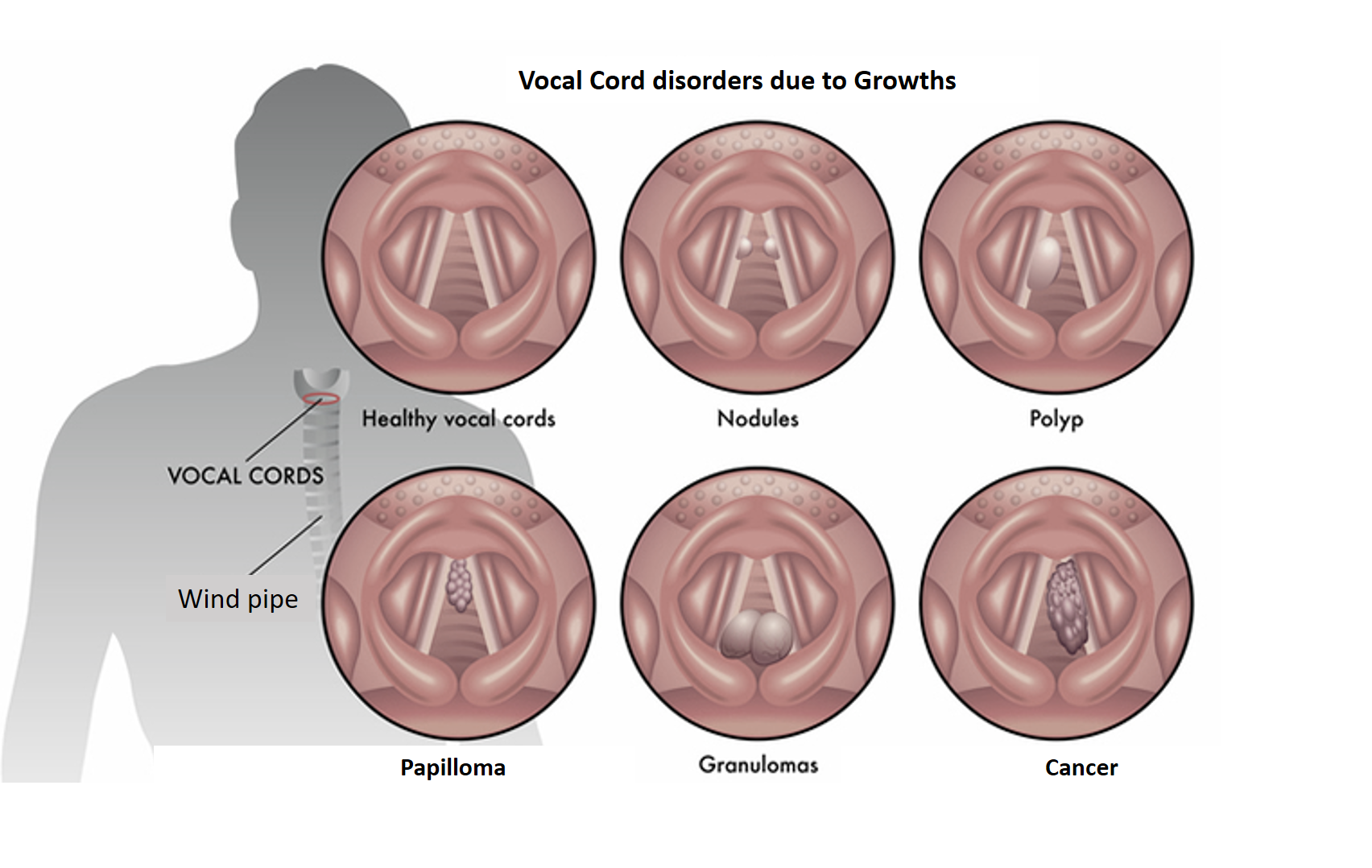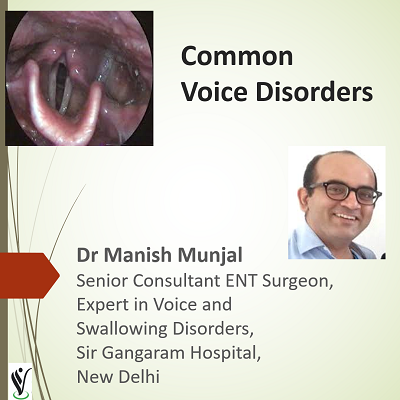The Human Voice is the Echo of one’s personality, and also a reflection of one’s health.
How is Voice produced?
Voice is the sound that air makes when it is forced out of the lungs to pass over the 2 folds of tissue inside the larynx, also called the voice box. The vibration of those cords is what produces phonation. Furthermore, the lower throat, tongue, cheeks, and lips take part in producing a particular person’s characteristic phonation (a person’s voice, sound, and speech.)
What are the symptoms of a voice disorder?
If you have a voice disorder, your voice may:
- Sound rough or harsh (hoarseness)
- Sound strained or choppy
- Have a quivering sound
- Be weak, whispery, or breathy
- Be high or low or change in pitch
- Feel painful to speak, even though the listeners might not feel it.
- Feel as if there is a lump in the throat while speaking.
What causes voice disorders?
The term dysphonia refers to having an abnormal voice. Changes to the voice can occur suddenly or gradually over time. Voice disorders can be caused by many factors. In some cases, the cause of a voice disorder is not known. Possible causes can include:
1. Growths: In some cases, extra tissue may form on the vocal cords. This stops the cords from working normally. The growths can include:
- fluid-filled sacs called cysts
- wart-like rough lumps called papilloma
- callus-like bumps called nodules. (Callus is a thickened area due to repeated pressure, friction or irritation)
- small areas of chronic inflammation called a granuloma
- small blisters called polyps.
- patches of damaged tissue called lesions
- areas of scar tissue.
- a band of tissue called a web growing between the vocal cords.
- tumors or cancerous growths
Growths can have many causes, including illness, injury, cancer, and vocal abuse.



2. Inflammation and swelling: Many factors can cause inflammation and swelling of the vocal cords. These include surgery, respiratory illness or allergies, GERD (acid reflux), some medicines, exposure to certain chemicals, smoking, alcohol abuse, and vocal abuse.
3. Nerve problems: Certain medical conditions can affect the nerves that control the vocal cords. These can include multiple sclerosis, myasthenia gravis, Parkinson’s disease, Amyotrophic lateral sclerosis (ALS), and Huntington’s disease. Nerves can also be injured from surgery or chronic inflammation of the larynx (laryngitis). Spasmodic dysphonia is a voice disorder leading to involuntary spasms in the muscles of the voice box causing the voice to break and have a tight, strained or strangled sound. This is usually due to a central nervous system disorder in the basal ganglia of the brain that helps coordinate muscle movement, and can occur as an inherited condition or start after a cold, voice box injury, prolonged voice use, or stress.
4. Hormones: Disorders affecting the thyroid gland, female and male sexual hormones, and growth hormones can cause voice disorders.
5. Voice Misuse or Vocal Abuse: Vocal abuse is anything that strains or harms the vocal cords like too much talking, shouting, too much strainful singing, coughing, smoking and constant clearing of the throat. Vocal abuse can cause the vocal cords to develop calluses or blisters called nodes and polyps. These change how the voice sounds. In some cases, a vocal cord can rupture from vocal abuse. This causes the cord to bleed (hemorrhage) and can cause loss of voice. Vocal cord hemorrhage needs to be treated as an emergency.
6. Laryngeal Muscle Tension: The vocal cords can be stressed by tension in the throat and laryngeal muscles. Laryngeal muscle tension can occur due to a cycle of recurrent upper respiratory infections, allergies, irritant exposure, speaking or singing with strain and incorrect technique, stress and anxiety, and sometimes acid reflux. This can cause problems in the muscles in the throat, and affect the voice, as the laryngeal muscles become strained and tense, leading to voice fatigue and reduction in voice flexibility/range (muscle tension dysphonia – MTD). Other manifestations of laryngeal muscle tension can also be difficulty in swallowing or a feeling of food getting stuck in the throat (muscle tension dysphagia MTDg).
How are voice disorders diagnosed?
If you have a voice change that lasts for a few weeks, your healthcare provider may send you to see a throat specialist called an otolaryngologist (Ears, Nose and Throat specialist or ENT).
An otolaryngologist will ask you about your symptoms and how long you’ve had them. He or she may examine your vocal cords and your larynx using certain tests. These may include:
- Laryngoscopy. This lets the doctor view the throat. With indirect laryngoscopy, the healthcare provider holds a small mirror at the back of the throat and shines a light on it. With fiberoptic laryngoscopy, a thin, lighted scope called a laryngoscope is put through your nose down into your throat, or directly down into your throat.
- Laryngeal electromyography, or EMG. This test measures electrical activity in the muscles of the throat. A thin needle is put into some of the neck muscles while electrodes send signals from the muscles to a computer. This can show nerve problems in the throat.
- Video Stroboscopy. This test uses a strobe light and a video camera to see how the vocal cords are vibrating during speech.
- Imaging tests. X-rays and MRI can show growths or other tissue problems in the throat.
How are voice disorders treated?
Treatment for a voice disorder depends on what’s causing it. Treatment may include:
- Lifestyle changes. Some lifestyle changes may help reduce or stop symptoms. These can include not yelling or speaking loudly, and resting your voice regularly if you speak or sing a lot. Exercises to relax the vocal cords and muscles around them can help in some cases. Warming up the vocal cords before extensive periods of speaking, and staying hydrated is recommended. Laryngeal massage techniques are also advocated in some cases.
- Speech therapy. Working with a speech-language therapist can help with certain voice disorders especially those associated with laryngeal muscle tension. Therapy may include vocal and breathing exercises and changes in speaking and singing behaviors. Some of these may include maneuvers that time deep breaths to power vocalizations with adequate breathing.
- Medicines. Some voice disorders are caused by a problem that can be treated with medicine. For example, antacid medicine may be used for GERD, or hormone therapy for problems with thyroid or female hormones.
- Injections. Your doctor can treat muscle spasms in the throat with the injection of botulinum toxin. In some cases, your doctor can inject fat or other fillers into the vocal cords. This can help them close better.
- Surgery. Your doctor can surgically remove some tissue growths. If the growth is cancerous, you may need other treatments, such as radiation therapy.
Tips for keeping your voice healthy
- Make sure you hydrate yourself well. An extra 6-8 glasses of water is something that would lubricate your throat more and reduce the friction on your vocal cords.
- Avoid throat clearing, coughing, whispering, shouting, excessive voice strain and vocal abuse, as they are bad vocal hygiene habits. These lead to unnatural strain on the vocal cords, sometimes leading to permanent scarring and thickening, and thus a bad voice for life! If your throat feels irritated, try a sip of water and do DEEP SWALLOWING instead.
- Besides formal speech therapy, you should practice HUMMING therapy on your own. Inhale deeply, and then slowly release the sound HMMMMM…through your nose. Go soft, and low pitch to slightly high over, a period of a few seconds. Repeat a few times.
- Improve your chest and abdominal support. An upright comfortable sitting or standing position is the best for speech and singing. In order to reduce strain, you must learn to speak slower, allowing for breathing spaces in between. Correct abdominal and breathing support is crucial to reduce voice strain while singing.
- Good dietary habits are a key to good voice. Unhealthy oils, spices, and overeating, especially at dinner time increase acidity levels in your throat, also called GERD (gastroesophageal reflux disease) and LPR (Laryngo-pharyngeal reflux), thus causing phlegm deposition, inflammation and swelling.
- We all know that smoking causes throat, mouth and lung cancer. It is but natural to suggest that this extravagance must be kicked out of your daily routine as soon as possible. The dehydrating effects of alcohol also warrant its use as moderately as possible.
- Do not speak at all for 2 days in case you have undergone vocal cord surgery or are suffering from a very bad throat infection. A tired horse needs to be rested.
Dr Manish Munjal is a Senior Consultant ENT Surgeon, and expert in Voice and Swallowing Disorders at Sir Gangaram Hospital New Delhi. After due training with renowned Laryngologists (Voice Surgeons) in Portland (Oregon), UCLA (California), and Manchester (UK), he set up North India’s First of its kind KAY PENTAX Voice Clinic at SIR GANGARAM Hospital specially caring for voice and swallowing disorders. He is also the Honorary Secretary of Laryngology and Voice Association of India, and faculty at major national and international conferences.


